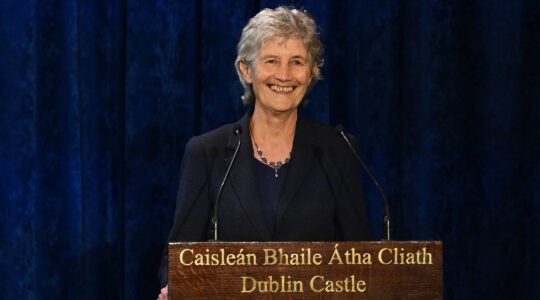DNEPROPETROVSK, Ukraine (JTA) — Anatoly Lazaurenko’s face betrays no emotion as he watches footage of an old woman he used to know lying in the rubble of what once was his home in the war-torn city of Slavyansk.
Oblivious to her mangled face, Anatoly, 8, points to a corner of the computer screen to indicate the bombed-out apartment in eastern Ukraine that his family fled last month as a tense standoff between pro-Russian separatists and Ukrainian government forces escalated into urban warfare.
Like many Ukrainians, the boy has become inured to disturbing sights after months of violent conflict in his country. Even after watching the video, Anatoly says he would rather be home — under fire, but with his friends and classmates. But his mother insists they are staying with relatives near Dnepropetrovsk, far from the battle zone, as long as the fighting persists.
“Every day Anatoly asks me in tears if we can go back yet,” says his mother, Ludmila.
The Lazaurenkos are among hundreds of Jews made refugees by the fighting in eastern Ukraine, part of a larger movement of tens of thousands of people who have fled since pro-Russian militias — some toting heavy caliber machine guns and mortars — took up arms against government troops in March.
Hundreds already have died in the fighting, including the 298 passengers and crew aboard a Malaysia Airlines jet shot down over eastern Ukraine on Thursday by what American and Ukrainian officials say was a Russian anti-aircraft missile fired from rebel-controlled territory.
On Friday, two Jews — Svetlana Sitnikov and her daughter, Anna — were killed in an explosion in the eastern city of Lugansk.
The Jewish refugees are surviving on assistance from local and foreign Jewish groups that in recent weeks have launched major rescue and relief operations. The American Jewish Joint Distribution Committee and community officials are helping to provide housing, monthly stipends, food and medicine in what they describe as one of largest mobilizations in the history of Ukrainian Jewry.
“We’re talking about a multi-element package designed to improve the situation of each and every person who left the battle zone,” said Yoni Leifer, the head of operations in the Dnepropetrovsk region for JDC. A separate relief operation is being carried out by the Chabad-led Jewish community of Dnepropetrovsk.
The Lazaurenkos decided to leave Slavyansk last month after government forces began engaging the separatists. But Ludmila Lazaurenko does not blame Ukrainian troops, who launched their offensive following the standoff with the rebels.
“We were pro-Russian,” Lazaurenko said of herself and her parents, Nadezhda and Alexander Belovol, who fled with her and Anatoly. “But that changed after we saw how they fought from inside the houses of civilians, with no regard for their lives. There is no excuse for that.”
Two weeks after the family left, they learned from a television news broadcast that their house had been blown up.
“We started crying when we saw that nothing was left,” Lazaurenko said. “We have nothing now.”
For those without relatives to take them in, JDC and the Jewish community of Dnepropetrovsk have arranged rooms in the community’s various institutions. The Beit Baruch old age home reached its capacity last week after 28 people were given spots in vacant rooms.
Among them are Rosa Dvoskina and Sofia Sanina, two women in their 80s who fled Slavyansk and Lugansk, respectively, earlier this month.
“I made it out, but I can’t stop thinking about my poor friends and neighbors who are still trapped there without water or medicines in a place full of death,” said a weeping Dvoskina, who had lived in her apartment building for 40 years before having to leave.

Elena Konigina, left, and her daughter Kseniya are staying at a resort near Pavlograd after fleeing Lugansk, Ukraine, in May. (Cnaan Liphshiz)
Like most refugees, Dvoskina and Sanina say they fled out of a general concern for safety unrelated to the fact that they are Jewish. But their neighbors at Beit Baruch, an Orthodox family of seven from Donetsk who requested not to be named, said anti-Jewish graffiti began to appear in the city as the rule of law weakened.
“We started seeing swastikas painted on park benches, buildings,” the family’s grandfather said.
Amid lingering uncertainty about the future of Ukraine’s embattled eastern border cities, Dvoskina and Sanina are thinking about immigrating to Israel, though they would prefer to return to their homes. Other refugees, including Elena Libina from Donetsk, are determined to leave permanently for Israel.
Libina is staying in a community facility in Dnepropetrovsk only until her immigration application is approved. Meanwhile, the Jewish community is arranging for the rescue of her 91-year-old aunt, who remains trapped in Lugansk.
“We felt the tension rising and noticed that bus tickets out of the city were increasingly becoming more expensive,” Libina told JTA. “When they bombed the administration building, I left.”
Dnepropetrovsk is one of Ukraine’s largest Jewish communities, with 50,000 members. Several oligarchs, including the banking magnate Igor Kolomoisky, have poured millions into the community’s institutions, including several Jewish schools and the $100 million Menorah Jewish Community Center, a 450,000 square-foot facility that includes luxury mikvah baths, kosher restaurants, a Holocaust museum and a day care center.
Zelig Brez, the community’s director general and right hand of the city’s influential chief rabbi, Shmuel Kamenetsky, said organizing the rescue and relief operation isn’t merely a religious duty but part of his responsibility toward Ukraine’s smaller Jewish communities.
“It comes with the territory of being an engine of Jewish life in Ukraine,” Brez said.
The community has made wide use of its facilities to help house the refugees. Elena Konigina and her 12-year-old daughter, Ksenia, have stayed at a scenic countryside resort near the Dnepropetrovsk suburb of Pavlograd since they fled Lugansk in May.
Konigina would like to immigrate to Israel, but Ksenia is a minor and cannot exit the country without the consent of both parents. Konigina says she does not know how to reach Ksenia’s father, whom she divorced several years ago.
Even if she could go, Konigina worries that the situation in the Jewish state won’t be much better.
“I don’t know what good that will do,” Konigina said. “They are shooting there, too.”
JTA has documented Jewish history in real-time for over a century. Keep our journalism strong by joining us in supporting independent, award-winning reporting.





